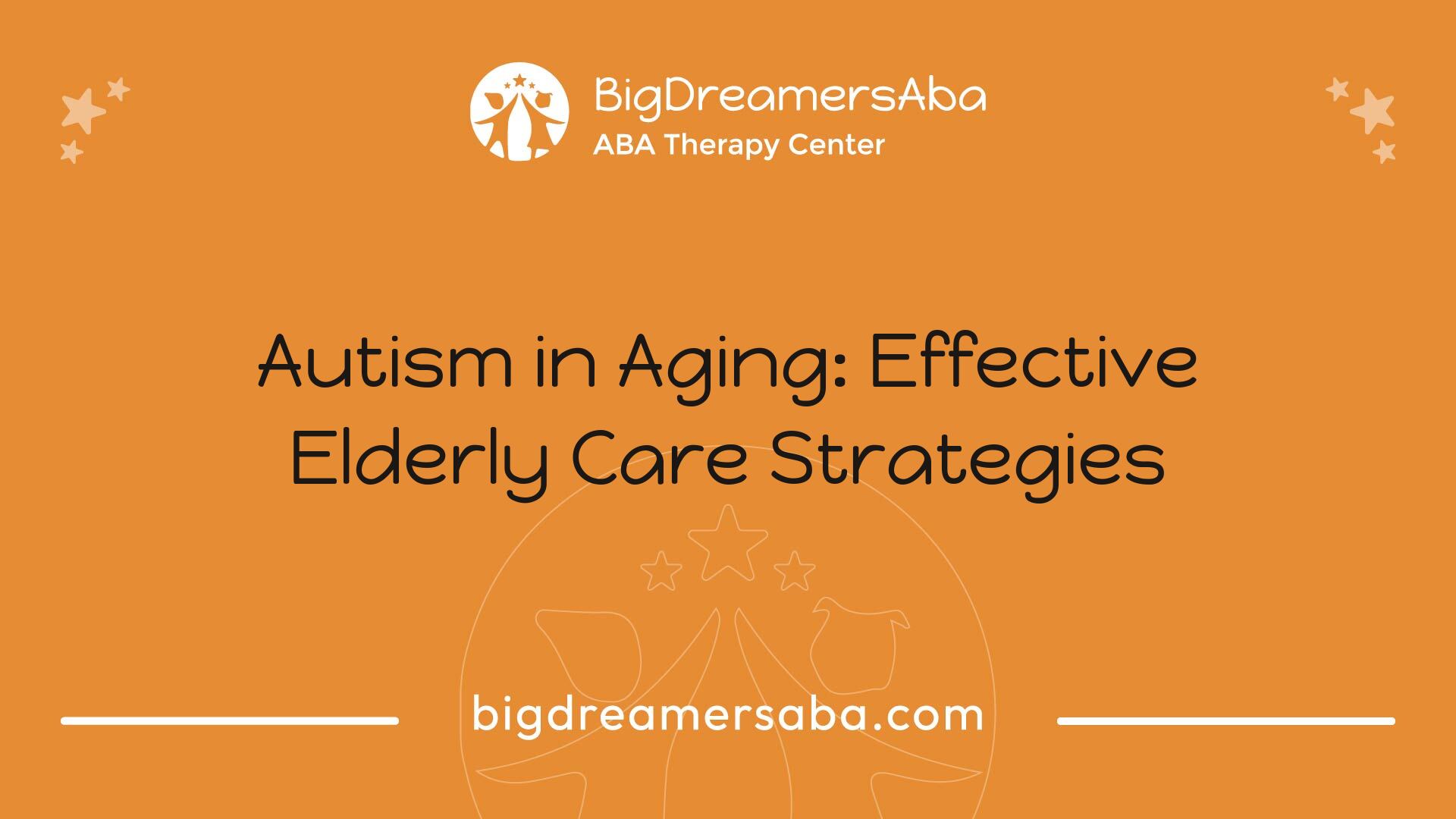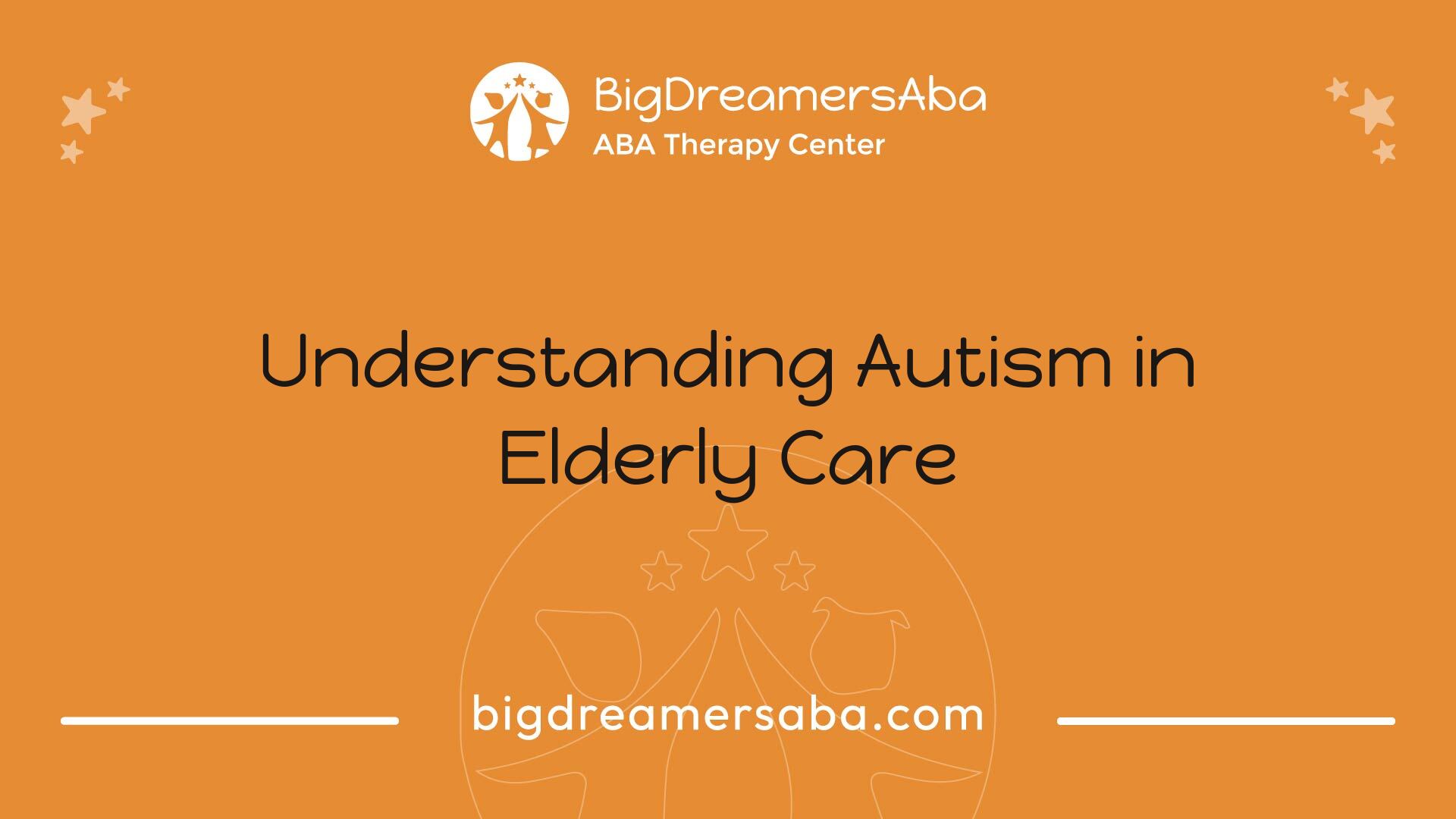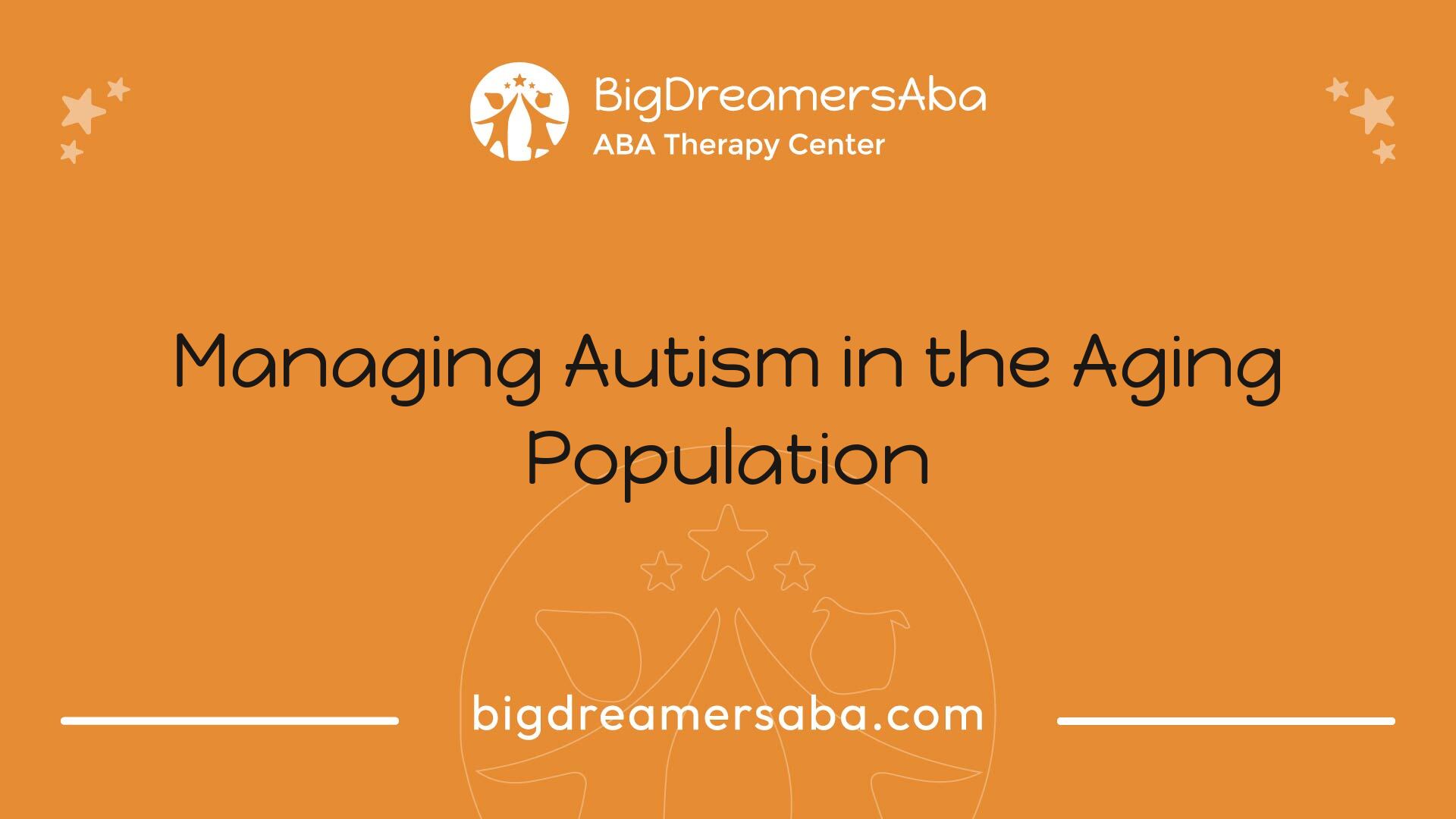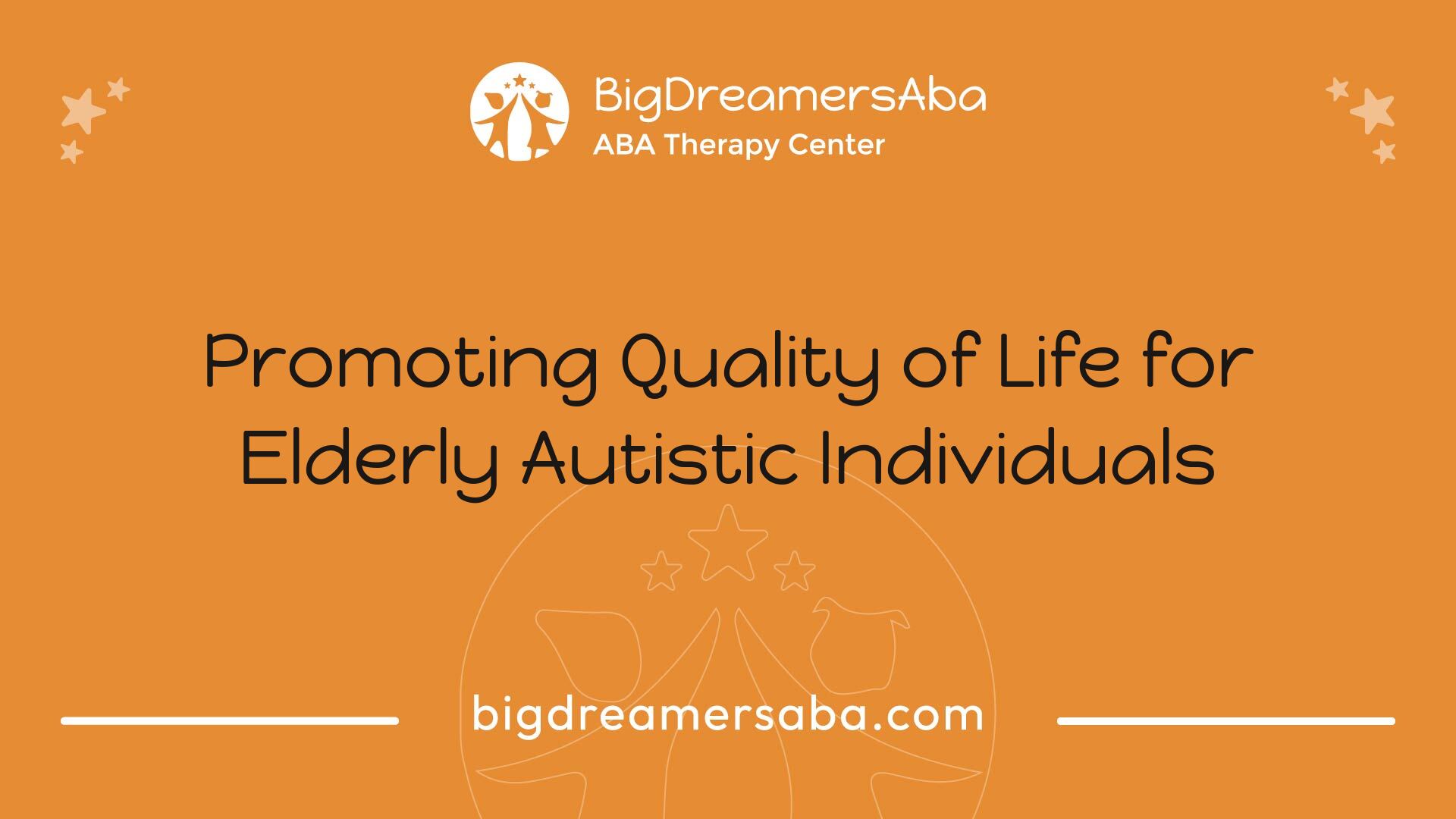Autism in Aging: Effective Elderly Care Strategies
Explore autism elderly care strategies to enhance quality of life and support for aging autistic individuals.

Understanding Autism in Elderly Care

Caring for elderly individuals with autism presents unique challenges and considerations. Understandably, their sensory sensitivities and communication difficulties can greatly impact their daily experiences and overall well-being.
Sensory Sensitivities in Autism
Many elderly individuals with autism experience sensory sensitivities that affect how they perceive the world. Sensory differences can range from debilitating to empowering. These individuals may be hypersensitive, hyposensitive, or experience both issues at different times, thus requiring varying levels of stimulation to feel comfortable [1].
Key sensory sensitivities include:
Sensory ModalityDescriptionHearingAutistic individuals may have heightened sensitivity to sounds, perceiving noises at louder volumes and from greater distances.VisionSome individuals may be overwhelmed by too much visual information or have distressing reactions to certain patterns and lighting, especially fluorescent lights.TouchResponses to tactile stimuli can be heightened or diminished, requiring tailored approaches for comfort.
Because of these sensitivities, it is essential to create an autism-friendly environment that minimizes negative stimuli and enhances positive experiences. Proper lighting choices and sensory-friendly spaces can significantly improve comfort levels for elderly autistic individuals.
Communication Challenges in Older Adults
Communication difficulties are common in elderly individuals on the autism spectrum. Many may struggle to convey their needs effectively or interpret the messages of others. This can lead to feelings of frustration and isolation, complicating other aspects of care.
Some factors affecting communication include:
FactorDescriptionDifficulty with TransitionsAutistic individuals may find it challenging to switch between different activities or environments, requiring structured routines. (Golden Care Therapy)Social InteractionThey may have limited experience with social norms and may not pick up on nonverbal cues, which can lead to misunderstandings in communication.Information OverloadToo much sensory input or complex verbal communication can lead to confusion and anxiety.
Effective care strategies must consider these communication challenges. Tailored approaches that prioritize patience, clarity, and routine can foster better interactions and help meet the needs of elderly individuals with autism. For additional resources on care strategies, explore our section on autism nursing care plan.
Managing Autism in the Aging Population

Managing the needs of aging individuals with autism requires specialized strategies and support systems tailored to their unique challenges. Effective elderly care in this demographic can improve their quality of life and ensure well-being.
Tailored Care and Support Strategies
Individuals on the autism spectrum often experience hypersensitivity or hyposensitivity to stimuli, which can change throughout the day. A tailored approach to care involves creating environments that respect sensory preferences and enhancing communication tactics that accommodate these variations.
To implement effective care strategies, consider the following table detailing specific approaches:
Care StrategyDescriptionSensory AdaptationModify environments to reduce sensory overload, such as using soft lighting and minimizing background noise.Structured RoutinesEstablish predictable daily routines to help ease transitions between activities, which is particularly beneficial for those requiring structure.Communication ToolsUtilize picture communication systems or other visual aids to aid understanding and expression.
Caregiver training, such as the Caregiver Skills Training (CST) program, can equip caregivers with vital skills. This program focuses on communication, engagement, and positive behavior management strategies that can greatly enhance the caregiving experience for autistic elderly individuals.
Specialized Healthcare Services
Access to specialized healthcare services is essential for elderly individuals with autism. These services must consider their specific healthcare needs and the potential for co-occurring conditions such as dementia. Research indicates that approximately 25-33% of individuals aged 85 years or older experience dementia, and those with autism may have an increased risk of developing such conditions [2].
Healthcare providers should ensure comprehensive assessments and create individualized care plans that address both autism-specific needs and general geriatric requirements. The following services may be beneficial:
Specialized ServicePurposeGeriatric AssessmentEvaluate overall health and cognitive function to tailor medical care.Behavioral Health SupportProvide mental health resources addressing anxiety, depression, and social challenges common among autistic individuals.Dementia Care ProgramsSpecialize in addressing symptoms and behavioral changes associated with dementia, particularly in patients with autism.
Incorporating these tailored care strategies and specialized healthcare services can greatly support elderly individuals with autism, enhancing their overall quality of life and aiding their families in navigating these unique challenges. For more insights on developing autism-specific care approaches, explore our article on autism nursing care plan and other related topics.
Promoting Quality of Life for Elderly Autistic Individuals

Enhancing the quality of life for elderly individuals with autism involves taking specific actions that address their unique needs. This encompasses building social connections and ensuring physical and emotional well-being.
Building Social Connections
Building and maintaining social connections is essential for the well-being of older adults with autism. These connections can significantly reduce feelings of isolation, provide a sense of belonging, and contribute to a fulfilling life. Here are several approaches to promote social interactions:
StrategyDescriptionCommunity GroupsEncourage involvement in local autism support groups or community centers where they can meet others with shared experiences.Structured ActivitiesOrganize regular social activities, such as game nights or arts and crafts, that provide engaging and low-pressure opportunities to socialize.Family EngagementInclude family members in social outings to help older adults feel supported and connected.
By fostering these connections, caregivers can help elderly individuals with autism thrive socially.
Ensuring Physical and Emotional Well-being
Physical and emotional well-being is pivotal for elderly individuals on the autism spectrum. Understanding sensory sensitivities, which may persist into old age, is crucial for creating a comfortable living environment. For instance, elderly individuals may continue to be sensitive to loud noises, bright lights, or strong odors.
Key strategies to enhance well-being include:
Focus AreaAction StepsPhysical HealthEncourage regular physical activity suited to their capabilities, such as walking or gentle stretching exercises.Emotional SupportProvide a calm and reassuring atmosphere, incorporating relaxation techniques like deep breathing or meditation.Sensory ConsiderationsModify the living space to reduce sensory overload by dimming lights, using noise-canceling devices, or maintaining a clutter-free area to foster tranquility.
Caring for an elderly individual with autism requires understanding, patience, and comprehensive support. Caregivers should not only prioritize their own well-being but also explore resources such as specialized autism nursing care plans to ensure effective assistance for those in their care.
Addressing Cognitive Changes in Aging Autistic Adults
Cognitive changes in aging autistic individuals can present unique challenges that vary in severity. Understanding how to assess cognitive function and identifying cognitive challenges are essential steps in providing effective autism elderly care.
Cognitive Function Assessment
Assessing cognitive function in elderly individuals with autism typically involves various evaluation methods. These assessments help to identify specific deficits and areas requiring additional support. The tools commonly used include standardized tests and observational techniques to measure cognitive domains such as memory, problem-solving, and executive functioning.
Assessment MethodDescriptionStandardized TestsFormalized assessments that measure specific cognitive abilities.Clinical InterviewsDiscussions with caregivers and professionals to gauge behavioral and cognitive changes.Direct ObservationsIn-person monitoring of an individual’s cognitive behaviors in different settings.
It is crucial for caregivers and healthcare providers to collaborate with specialists when determining appropriate assessment strategies. Cognitive decline can be more pronounced in older adults with autism, and utilizing comprehensive evaluation methods can facilitate timely intervention.
Cognitive Challenges and Interventions
Elderly individuals with autism often confront persistent cognitive challenges, particularly executive functioning deficits. Research indicates that these deficits, including issues with working memory, planning, and cognitive flexibility, often remain stable or may worsen with age [5].
Common Cognitive ChallengesPotential InterventionsExecutive Function DeficitsUtilize stress-observing devices and adaptive response technology to enhance cognitive support.Difficulty with MemoryImplement memory aids like visual prompts and reminders.Planning IssuesUse structured schedules and provide step-by-step instructions.
Interventions tailored to individual needs can significantly enhance cognitive functioning and overall quality of life. Emerging technologies such as virtual reality-based interventions can offer innovative methods to improve social communication behavior and track cognitive engagement [6].
Addressing cognitive changes proactively ensures that caregivers can create a supportive environment for elderly autistic individuals, ultimately promoting their well-being and quality of life.
Creating an Autism-Friendly Environment for Elderly Care
For elderly individuals with autism, creating a supportive and understanding environment is key to enhancing their quality of life. This section focuses on home care considerations and the importance of sensory-friendly spaces.
Home Care Considerations
Home care for elderly individuals with autism offers distinct advantages. A familiar environment can greatly enhance comfort and promote a sense of security. Tailoring care to individual needs is vital to ensure that each person receives the support necessary for their well-being. Key considerations include:
Home Care FeaturesImportanceIndividualized Care PlansAddresses specific needs and preferencesComfortable EnvironmentReduces anxiety and stressRoutine and StructureProvides predictability and comfort
According to Mastermind Behavior, providing a sensory-friendly space is crucial for reducing stress and anxiety in elderly individuals with autism. This involves incorporating familiar elements and minimizing disruptions in their environment.
Sensory-Friendly Spaces
Sensory sensitivities are common among individuals with autism, and these sensitivities can become more pronounced as they age. Creating a sensory-friendly environment is essential for elderly individuals with autism. Key adjustments include:
Implementing these changes can significantly improve the quality of life for elderly individuals with autism. A collaborative approach involving caregivers, healthcare professionals, and family members is essential for providing comprehensive care [7].
Creating an autism-friendly environment not only supports the needs of elderly autistic individuals but also enhances their overall well-being. By focusing on these home care considerations and sensory-friendly spaces, one can promote a sense of security and comfort that is essential for aging with autism.
Advocacy and Support for Elderly Individuals with Autism
Advocacy and support play a crucial role in enhancing the quality of life for elderly individuals with autism. This includes implementing effective caregiver training programs and providing healthcare navigation support.
Caregiver Training Programs
Caregiver training programs are essential for equipping caretakers with the skills and knowledge necessary to support elderly individuals with autism. Such programs focus on teaching effective communication strategies, problem-solving, and self-care skills, which helps caregivers feel more confident in their roles. These programs aim to reduce stress and enhance overall well-being while ensuring they can adequately support the unique needs of adults with autism [8].
Program FeatureDescriptionSkills DevelopmentFocus on communication, coping strategies, and self-care techniquesStress ManagementTechniques to help reduce caregiver stress and improve mental healthConfidence BuildingWorkshops to empower caregivers through knowledge and practical skills
The integration of caregiver training into the framework of autism elderly care promotes a more informed support system, ultimately benefiting the quality of care provided.
Healthcare Navigation and Support
Effective healthcare navigation and support are vital for elderly individuals with autism, as managing their care can often be complex. A collaborative approach between caregivers, healthcare professionals, and family members is essential for delivering comprehensive care. This teamwork helps to enhance communication and ensures that the specific needs of autistic individuals are met [7].
Advocacy initiatives, such as the Autism Family Caregivers Act, aim to provide grants to caregiver skills training organizations, thereby improving the health and well-being of individuals with autism. Accessing and utilizing available resources can significantly benefit elderly autistic individuals by promoting their rights and inclusion in society.
By focusing on both caregiver training and healthcare navigation, a stronger support network can be created for elderly individuals living with autism. This network not only improves their quality of life but also fosters a greater sense of community and understanding.
References
[2]:
[3]:
[4]:
[5]:
[6]:
[7]:
[8]:
Recent articles

How to Incorporate Choice-Making in Home-Based ABA Therapy

The Role of Desensitization Strategies in ABA Therapy
